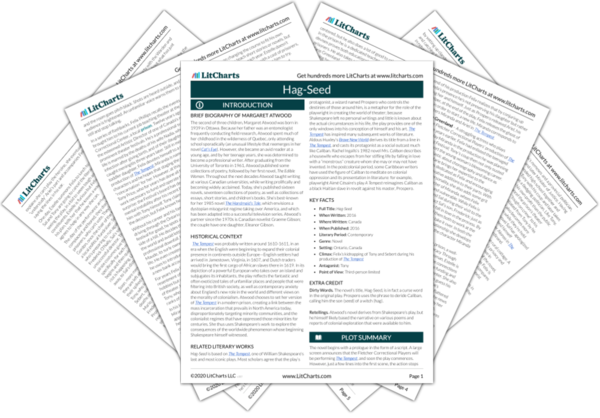Set in a idyllic Ontario town, Hag-Seed is Margaret Atwood’s retelling of Shakespeare’s play The Tempest. Just as the play’s protagonist, Prospero, seeks revenge on the man who steals his kingdom, Felix wants to get back at Tony, a former colleague who supplants him as director of a prestigious theater festival. For years after this act of betrayal, Felix is dominated by anger and bitterness. As his desire for revenge becomes more obsessive, it prevents him from building a fulfilling life and brings out the duplicitous and self-centered side of his character. Felix doesn’t get over these feelings until he’s finally able to avenge himself, but his vengeance takes the form of a clever scheme that actually benefits several other people. By presenting Felix’s final actions in this positive light, the novel shows the negative moral effects of a desire for revenge while also pointing out the ability of restorative action to provide fulfillment and closure after an instance of injustice.
At the beginning of the novel, Felix is dominated and crippled by his desire for revenge. He first appears brooding on his plot to get back at “that devious, twisted bastard, Tony,” whom he blames for ousting him from his directorial job and reducing him to living in an isolated cabin, teaching theater classes at a prison. Felix doesn’t have any friends, and he spends his leisure time obsessively observing Tony’s rise to political power on the Internet. While Tony certainly did Felix a disservice, it’s probable that he could find a better house or otherwise improve his life if he desired; in this sense, Felix uses his sense of betrayal to avoid challenging himself or confronting his insecurities.
Moreover, Felix’s desire for revenge leads him to make problematic moral choices. The theatrical revenge he eventually stages within the prison involves all the prisoners, exposing them to punishment or extended sentences; it also implicates Estelle, a prison advocate who stakes her reputation on his ability to do his job. In order to enact the scheme, he lies to almost everyone he knows, including people who have been kind to him for years. In this sense, his desire for revenge causes him to become as “twisted” and “devious” as the man he despises.
However, while Felix’s thirst for vengeance highlights the selfishness of his motivations, his revenge itself actually benefits all of the novel’s positive characters. Finding out that Tony and his political cronies, Sal and Sebert, are visiting the prison to see his play, Felix stages an “interactive” version of The Tempest during which he drugs and films his nemesis in order to destroy his political career. Tony is on the brink of announcing cuts to prison education programs like the one that Felix runs, but Felix uses the footage to blackmail him into increasing funding instead. He thus saves a social program that has proved immensely beneficial to the prison’s inmates.
He also takes the opportunity to throw together Frederick O’Nally, Sal’s son, and Anne-Marie, the tough but lonely actress playing Miranda. After the staging of The Tempest, the two young people embark on a relationship. While Felix uses his new power to reclaim his post as director of the theater festival, he grooms Frederick and Anne-Marie to take his place, improving their previously floundering careers.
Felix moves from seeing himself as a wronged and pitiable man to someone who can and does use his intelligence to help others. At the close of the novel, he’s less self-centered than he once was and more connected to the people around him, suggesting that he will be able to build a more fulfilling life in the future. Desiring revenge brings out the worst aspects of Felix’s character, but his method of achieving it demonstrates his good qualities and makes him a better person.
While the novel shows that an excessive hunger for vengeance can impair one’s ability to live a meaningful life, it steers clear of unrealistic platitudes about the importance of forgiveness. Rather, it shows how one’s worst impulses can be turned to personally and socially positive ends.
Vengeance ThemeTracker

Vengeance Quotes in Hag-Seed
His magic garment is hanging in there too, shoved to the back. The cloak of his defeat, dead husk of his drowned self.
No, not dead, but changed. In the gloom, in the gloaming, it’s been transforming itself, slowly coming alive.
This is the extent of it, Felix muses. My island domain. My place of exile. My penance.
My theater.
Fool, he tells himself. She’s not here. She was never here. It was imagination and wishful thinking, nothing but that. Resign yourself.
He can’t resign himself.
…the island is a theater. Prospero is a director. He’s putting on a play within which there’s another play. If his magic holds and his play is successful, he’ll get his heart’s desire. But if he fails…
Prospero says to the audience, in effect, Unless you help me sail away, I’ll have to stay on the island – that is, he’ll be under an enchantment. He’ll be forced to re-enact his feelings of revenge, over and over. It would be like hell.











